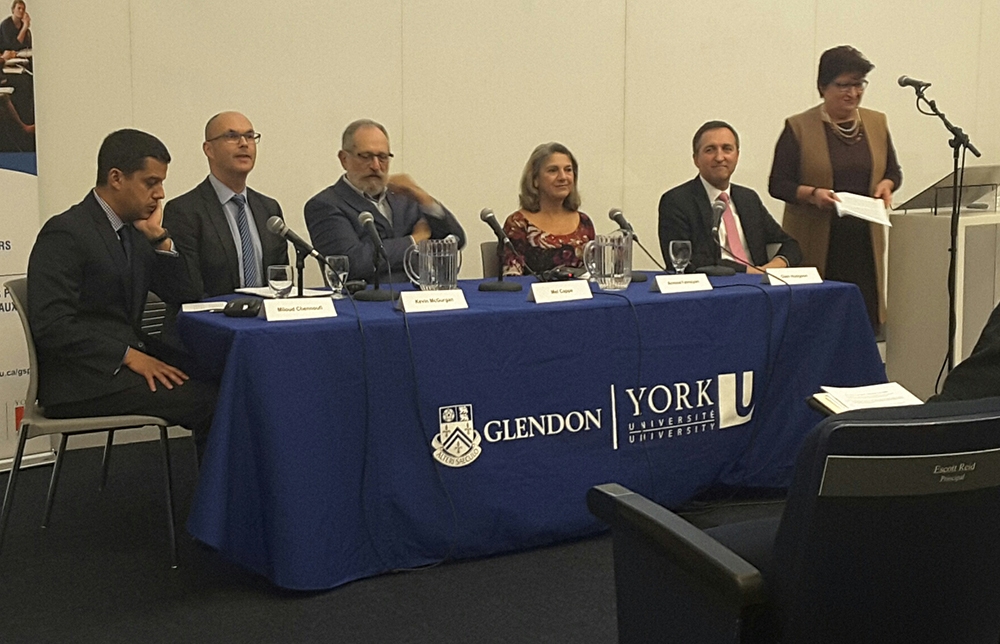Jonny Chard | Contributor
Featured image: Glendon college invites international experts to discuss Britain’s vote to leave the European Union. | Jonny Chard
On October 13, Glendon Campus hosted four internationally recognized experts to discuss and exchange views at Brexit: And Now What?, a discussion about the future for the United Kingdom and Canada following Britain’s vote to leave the European Union on June 23 of this year.
The debate focused on the administrative, legal and constitutional challenges for the UK, the short- and long-term implications for UK-EU relations, the implications it may have for Canada for the Comprehensive Economic and Trade Agreement, or CETA, and any future bilateral trade agreements.
The four guest speakers were Mel Cappe, Canada’s former Canadian ambassador to the UK; Glen Hodgson, senior fellow on the Conference Board of Canada; Kevin McGurgan, British Consul General and director-general for UK Trade and Investment; and Armine Yalnizyan, senior economist for the Canadian Centre for Policy Alternatives.
The EU referendum saw a turnout of more than 33 million voters, of which 51.9 per cent voted to leave the EU and 48.1 per cent voted to remain. Earlier this week, UK Prime Minister Theresa May announced that the process for leaving the EU would begin by the end of March 2017.
McGurgan opened the presentations with an overview of the official stance of the British government. McGurgan highlighted that the UK is well-placed to respond to the result, but stressed that negotiations would not be a simple task.
“Without doubt, the decision by the British people that the UK should leave the EU is not just the most significant political event in my 27-year career as a diplomat, but the most significant political event in my life,” he said.
He did, however, provide a positive outlook for UK-Canada relations, and hoped that the two nations would grow closer with trade deals and continued support for CETA.
Yalnizyan expressed a warning that Britain’s decision to leave may now create a “cascade” effect for other countries to call for referendums, putting the Eurozone’s future at risk.
Cappe summarized that this referendum “showed splits” between the old and young and the uneducated and educated, which will bring problems with national unity.
“This is a split between the future of Britain and the past,” Cappe summarized.
In his opinion, Britain and Canada’s relationship will continue, but will become increasingly complex.
The referendum was bad for Britain, the EU and Canada, and bad for those people who felt so disaffected that they felt like they had to send a message, he concluded.
Hodgson assured that there has been minimal impact so far, but there will be a long period of uncertainty. Clarity needs to be sought, but expanded trade between the UK and Canada is attractive and beneficial to both.
The result of the EU referendum shocked not only those in Britain, but those in the wider world. It has had an impact on currency values and major corporations have already begun looking to Europe for investment due to the uncertainty that surrounds Britain’s planned exit.
Hosted by the Glendon School of Public and International Affairs in partnership with the Canadian International Council, the debate was the first in a series of Glendon Global Debates which will examine Canada’s role in global affairs.





Félicitations, monsieur, pour ce beau ge8#o&ts230;persenellement, je mourrais pour participer aux fêtes de Poiret…mais pourquoi avoir choisi ce couturier, et non pas un femme, telle Jeanne Paquin? Par nationalisme? En outre, le Tout-Paris annonce déjà la venue d’une autre femme modiste-couturière, Mme Vionnet, ce sera pour très bientôt, il semblerait…